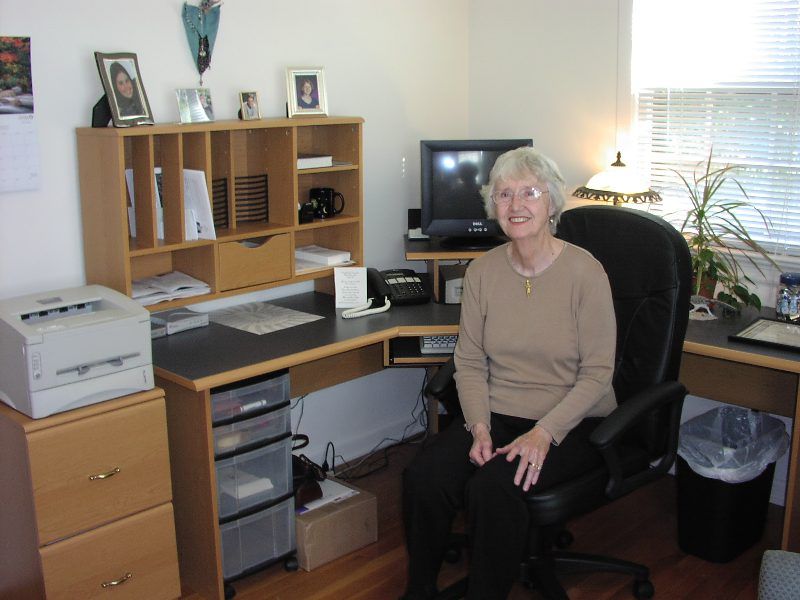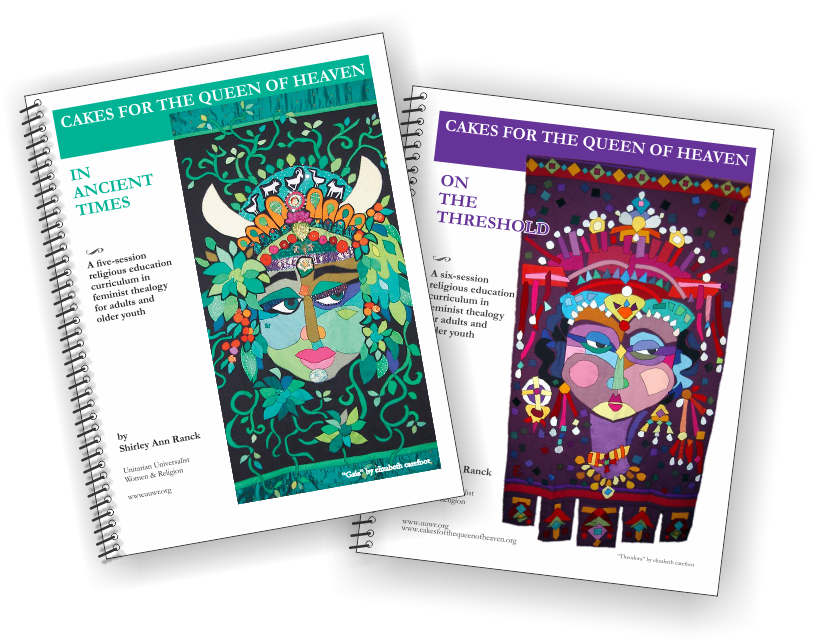 UUWF The Communicator June, 2006 | Vol 24, Issue 2
UUWF The Communicator June, 2006 | Vol 24, Issue 2
By Rev. Marti Keller, Decatur, GA
As a parish minister for several congregations and a chaplain for the annual UU Womenspirit gatherings at The Mountain in Highland, NC, I can personally testify to the continued impact of Cakes for the Queen of Heaven, the groundbreaking, adult religious education curriculum. Whenever candles (and chalices) are lit in our worship, chairs drawn up in a semi-circle instead of in rows; whenever directions are called, or the female names for divinity are invoked, the influence of Cakes, originally published in 1986, is still powerful.
Written by Rev. Shirley Ranck, this ten-session seminar in feminist theology was originally a boxed set of lessons plans, a collection of readings, songs and other resources, and film strips with illustrations of ancient goddesses. The creation of the program, a specific project on women’s religious history, was one of several actions taken to implement the resolution on Women and Religion, adopted by the 1977 UUA General Assembly.
Out of print and not widely available to a new generation of liberal religious women and men, it is now being given a deserved resurrection and republication by Unitarian Universalist Women and Religion, with the assistance of a $5,000 grant from our UUWF Grants Program. Goddess images from all over the world are being collected and will be displayed at the 2006 General Assembly in St. Louis in anticipation of the new edition, scheduled for publication in 2007. The book based on the course, first published in 1995, is also being republished and will be available at this summer’s assembly.
UUWF will honor Shirley during GA with our 2006 Ministry to Women Award, which is given to individuals or organizations who have ministered to women in an outstanding manner.
Shirley, who has been serving as the interim minister of the Williamsburg, VA, UU congregation, was also honored by her ministerial colleagues in the Southeast UU Ministers Association chapter this spring, sharing her personal odyssey.
In an oral history interview with Rev. Elinor Artman, whose contributions to the original curriculum included researching and cataloging photographs used in the film strips and poems depicting Old Testament stories from women’s perspective, Shirley recalled the beginnings of her work in this area.
At the time, she was a student at Starr King School for the Ministry. “(Since) I didn’t have any required courses to take, I decided to study women and their religious history, in as much as it was there to be studied,” Shirley said. “So I got involved in collecting slides of ancient goddesses and in trying to dig out the history of women and religion.”
While working as a secretary at the Graduate Theological Union after finishing at Starr King, she had a conversation with Jacob Needleman, who had been given a substantial grant to study new religious movements. He used some of these funds to commission Shirley to write a paper and teach a course “on goddesses and female imagery and Judaism and Christianity and whatever I could put together.” This led to a course in feminist theology (from thea, the Greek word for goddess) and the eventual creation of the Cakes program.
Rev. Leslie A. Westbrook, then the UUA consultant for Adult Programs and Minister for Women and Religion, called and told Shirley that the UUA needed a study guide “so that people in congregations can do what the resolution calls for, which is to examine our theologies and practices and root out all the sexism,” Shirley recalled. “She said: ‘would you like to write the guide?’ I said, ‘Oh? I’d love to do it.’”
What was going to be a little study guide grew into a curriculum kit that took five years to research, develop, write and publish. Significantly, each session of Cakes included an opening focusing ritual: lighting a candle and reading one or more poems.
This practice is one of the contributions that Shirley Ranck and other women have
made to UU worship. Women who had experienced the course, “picked it up and made changes in the worship life of their own congregations out of a need for personalizing the services with a little more ritual,” Shirley observed. There was a need for more than a lecture and discussion: not going back to a traditional Christian liturgy, but incorporating the new women’s rituals that were emerging.
What are the feminist curricula needed for 21st century? While there is still research to be done and courses to be written that teach and reclaim women’s religious history in more pluralistic
ways, what is also missing are some of the emerging personal issues. These range from the pre-occupation with appearance that has led to eating disorders and breast implants to “power as an issue,” Shirley said. “And how do we make our way as women?”
Rev. Marti Keller is [as of this writing in 2006] the Social Justice Coordinator for the UU Congregation of Atlanta and chair of UUWF’s Margaret Fuller Awards Committee.


